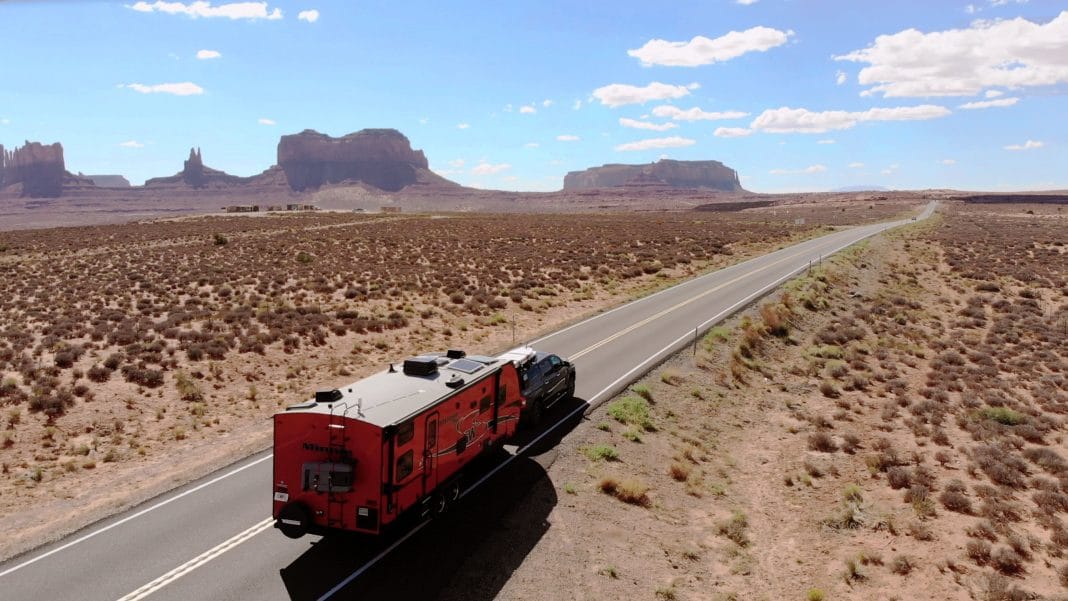Catch-22: A full-timer who wants no home, no city and no state can’t have what he wants.
You can say that you don’t live in any particular place, but the reality is that you have
to claim that you do. Every state requires that you have a license on your vehicle and a
license to drive it, and those licenses are issued only to residents. Which state you claim
is up to you, but, in most states, you must have a physical address there — a number on a
street or road. Only in a few instances will a post-office box number suffice. In short,
you have to claim residence somewhere in order to be legally on the road, but, in so doing,
you must claim something that isn’t true and, in effect, break a law — Catch-22. The good
news is that as long as you conform to the other laws in the state, you aren’t likely to
get into trouble, but you are legally obliged to pay whatever taxes the state imposes on
residents. A problem in the past (and probably still) was that some full-timers claimed
residence in one state to avoid paying one kind of tax and residence elsewhere to avoid
another. For example, person would purchase a motorhome in a state with no sales tax and
give an address in that state, but he also would claim residence in another state to avoid
state income tax. States with high sales taxes have been aggressive in catching and
punishing residents who have purchased and licensed motorhomes in no-sales-tax states, and
penalties have been severe. It has become a risky business to use “dual citizenship” to
save money. For most full-timers, choosing a state for a home base isn’t a big problem. If
you don’t have a large income, you don’t have to worry about state income taxes. If your
coach isn’t really expensive or heavy, you generally won’t have to pay a huge sum each year
for a vehicle license. And if you don’t own real estate, you won’t pay property taxes. On
the other hand, you could have a substantial income, own an expensive motorhome and face a
real challenge when choosing a home base. If you have substantial taxable income, then
consider the no-income-tax states: Alaska, Florida, Nevada, New Hampshire, South Dakota,
Texas and Washington. But there are other considerations. Alaska imposes no sales-tax
liability when out-of state vehicles are registered and has an inexpensivelicense fee.
However, Alaska does require a physical address, and the law is specific about residency
requirements and penalties for violations. Although New Hampshire has neither income nor
sales tax, license fees are based on vehicle weight, so a license for a big motorhome can
be pricey. There’s also a tax when registering a vehicle from out of state, and an annual
vehicle-safety inspection that requires the registered owner’s presence during his or her
birthday month. Nevada has inexpensive license fees and no income tax, but a high sales tax
and a “privilege tax” based on a vehicle’s value, and some counties impose a “supplemental
privilege tax.” When out-of-state vehicles are registered, a relatively high tax is
imposed. Washington has no income tax, but a high sales tax. Credit is given for sales tax
already paid in another state, but any difference must be paid. License fees are
inexpensive; e.g., $30 for motorhomes. Florida has long been a choice for many full-timers.
Not only does it have no income tax, but it has an inexpensive annual license fee ($46.60
for motorhomes of 4,500 pounds or more). However, registering vehicles from out of state
can cost 6 percent if no sales tax has been previously paid (credit is given for tax
already paid) and there is a $100-per-vehicle registration fee. Texas also is a popular
home-base state for full timers, partly because the Escapees Club provides members a legal
address in a state with no income tax. However, be aware of costs involved to register
out-of-state rigs; there’s a $225 safety inspection and a $90 new-resident fee. License
fees are $42 annually for motorhomes. South Dakota is a state that’s growing in popularity
with full-timers, partly due to the fact that a post-office box suffices. There is no
income tax and a low sales tax (4 percent). Registering rigs from out of state costs 3
percent, but reciprocity is granted for tax paid in another state, and license fees are
reasonable. In the United States, we have the right to be residents of whatever state we
choose. None is perfect, but there’s a “best state” for every pocketbook. To compare all
the state taxes and registration fees, see the 2003 edition of Selecting an RV Home Base;
call (800) 766-1674, or log on to tldirectory.com to order a copy. And before you make a
decision, verify the current information with the appropriate state agencies.
Lifestyle: Where Do You Hang Your Hat?
Originally Published in MotorHome Magazine

Do not have an account? Create New Account

